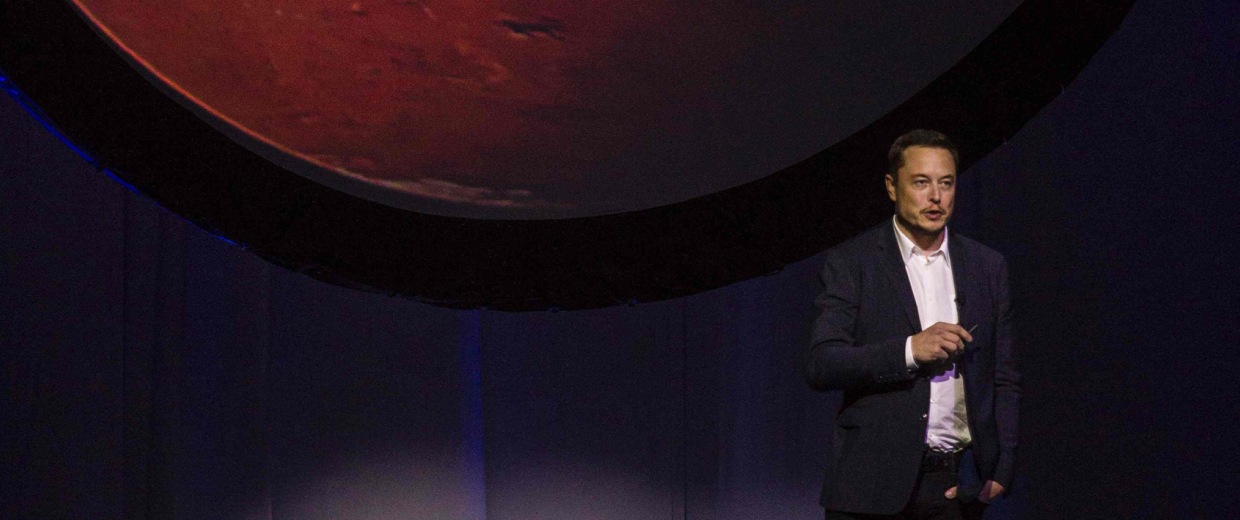If Elon Musk has his way, a ticket to Mars will one day cost the same as the median U.S. house price — about $200,000.
Not cheap, but arguably affordable.
The SpaceX CEO delivered a speech Tuesday called "Making Humans an Interplanetary Species" at the International Astronautical Congress in Guadalajara, Mexico.
Colonizing Mars has long been a fascination for Musk, who used today's speech to dive deeper into his plan for sending fleets of spaceship — sort of like
Battlestar Gallactica, he said — to the Red Planet.
How much will it cost?
Using traditional space travel methods, Musk estimated one ticket to the Red Planet would cost a whopping $10 billion.
But achieving re-usability is key to lowering that price, Musk said. He pointed out, for example, it would cost around half a million dollars to take one trip on a Boeing 737 if it was only used once.
With planes being reused, that price is of course significantly less. Musk used the example of a flight from Los Angeles to Las Vegas on Southwest Airlines costing less than $50.
Why Mars?
Mars is our closest neighbor that would be the most habitable for humans. One Martian Day is 24 hours and 40 minutes, making it an ideal place to set up a colony.
Musk said the moon, which is smaller, is also a possibility for colonization, however a lunar day is almost as long as 28 Earth days.
How long will a trip take?
Musk envisions 100 to 200 people per spacecraft, with the trip taking between 80 and 150 days, depending on the time of the year. Mars is closest to Earth every 26 months, making that an ideal time to make the journey.
What will people do on that flight?
The longest flight of your life will supposedly be a lot of fun.
While there are some people who would happily volunteer to be the first to travel to Mars, Musk said he knows he'll have to make the the journey entertaining. He envisions a restaurant and an area where people can play games in zero gravity.
"In order to make it appealing ... it's got to be really fun and exciting. It can't feel cramped or boring," Musk said.
What challenges are ahead?
Funding is perhaps the number one challenge. Musk joked that a
Kickstartercampaign could be one option to help advance the interplanetary transport system.
Musk's plan relies on four pillars: re-usability, refilling in orbit, propellant production on Mars, and finding the right propellant in the first place.
After launching a spacecraft into orbit, it would stay there as its booster returned to Earth and launched with more propellant. This cycle could be repeated a few times before the spacecraft begins the journey to Mars.
Ideally, Musk said a fleet of spacecrafts would then depart en masse — sort of like Battlestar Gallactica.
Once on Mars, a propellant production plant would be built and that fuel would be used to return the spacecraft to Earth, where they could again be reused to bring back visitors.
Will Musk be the first man on Mars?
As much as he wants to go to Mars, it seems unlikely. The billionaire conceded that anyone going needs to be ready to accept the risk of death.
"I'd like to see my kids grow up," he said.
What's next?
It's still preliminary, but Musk believes we could have a fully sustainable civilization on Mars in 40 to 100 years.
"This is really about minimizing existential risk and having a tremendous sense of adventure," he said.
Getting to Mars has long been an obsession for the billionaire. Earlier this year, he revealed the SpaceX Red Dragon could be sent on an unmanned test mission to Mars as early as 2018.
If everything goes according to plan, Musk has said the first human mission could launch as early as 2024.
There's also a benefit in this for NASA.
The U.S. space agency will also be watching the first SpaceX mission closely and learning as NASA prepares for its own manned mission to the Red Planet in the 2030s.
The ability to slow down a spacecraft after it has been traveling at a high velocity is necessary for long haul trips, so how SpaceX lands on Mars could help NASA prepare for its mission.





